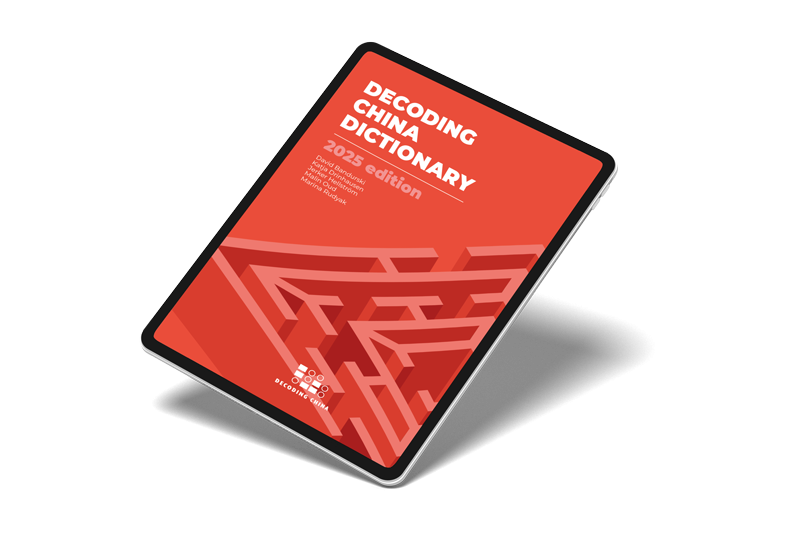
KEY TERM
Reciprocity
[ 对等 ]
[ 对等 ]
Reciprocity

In China, reciprocity is a defensive principle used to respond to perceived unequal treatment. It means China should be able to treat foreign entities as they treat China, often leading to tit-for-tat diplomatic exchanges.
Brief
Reciprocity is a social norm and a key principle in international relations, diplomacy, trade, and law that can be summarised as responding in kind to actions by others. Its meaning, however, varies greatly depending on the context and can be categorised into two types: positive and negative. Positive reciprocity involves returning favours or beneficial actions, while negative reciprocity involves responding in kind to harm or detrimental actions.[1]
A common connotation of reciprocity is that of reciprocal justice – “an eye for an eye” or “tit for tat”. Western calls for reciprocity, often in relation to China, typically focus on achieving balanced and fair trade that adheres to international agreements, highlighting the notion of a “level playing field”. In contrast, Chinese rhetoric on reciprocity emphasises mutual benefit and ‘win-win’ outcomes (互惠互利), terms commonly found in Chinese official documents and statements.
The Chinese leadership maintains that reciprocity should be “conditionalised”, taking disparities in economic development into account, as measured, for example, by GDP per capita. This means that China, in light of the country’s official status as a developing economy, should not be held to the same standards as developed economies.
Analysis
The concept of reciprocity is found in both western and Chinese ethical systems. In the West, it stems from the Christian instruction to treat others as you would want them to treat you. A negative variation (“do not do unto others what you would not want others to do unto you”) is attributed to Confucius in the Analects.
In modern-day Chinese official discourse, reciprocity is often intertwined with notions of mutual respect, mutual benefit, equality, and cooperation. Officials try to emphasise a collaborative and less confrontational approach to international relations by contrasting reciprocity with undesirable ideas of zero-sum thinking and a “cold war mentality”. Reciprocity, in this sense, is a cornerstone of the Five Principles of Peaceful Co-existence (1954), adopted in the 1960s by the Non-Aligned Movement. These principles underscore mutual respect for sovereignty and territorial integrity, non-aggression, non-interference, equality and mutual benefit, and peaceful co-existence, reflecting a vision where global cooperation trumps unilateral gain.
When engaging with partners in the Global South, China often emphasises reciprocity as part of a narrative of mutual respect and common development. China portrays itself as an altruistic provider of global public goods, contrasting this with the perceived selfish interests of Western powers. This narrative is reinforced by China’s diplomatic efforts, which highlight positive reciprocity, such as infrastructure investments in exchange for natural resources, or mutual support for domestic political issues. In developing economies that the Party-state considers friendly, it mostly refrains from retaliatory measures, prioritising potential geopolitical wins over economic interests.
Conversely, China’s relationship with liberal democracies, particularly the United States and the European Union, is often characterised by negative connotations of reciprocity. Beijing frequently criticises Western pressure on China to open its economy, arguing that stronger Western powers demand reciprocal actions from less developed economies without offering equivalent concessions.
In the context of trade relations, reciprocity is a contentious issue between China and the European Union. The EU advocates for strict reciprocity in market access and regulatory treatment, but China maintains that its status as a developing economy should be considered, arguing for conditional reciprocity. This fundamental disconnect was highlighted in 2019 when the European Commission ceased to consider China a developing country, denying Beijing’s requests for special treatment.
Regarding climate change, China also invokes a form of reciprocity that it calls “common but differentiated responsibilities”. This is a form of reciprocity where developed countries are expected to take the lead in reducing emissions, due to their historical contributions to the problem.
Reciprocity also plays a role in retaliatory measures. China explicitly invokes the principle of reciprocity when responding to actions perceived as hostile, such as the closure of diplomatic missions or the imposition of sanctions. However, China often does not acknowledge the reciprocal nature of its actions in diplomacy or trade, whether it involves detaining foreign nationals or imposing restrictions on foreign goods.
The term “win-win” is a prominent feature of Chinese diplomatic language, emphasising the avoidance of sensitive issues in bilateral interactions through “seeking common ground while putting aside differences”. This approach is contrasted with the European perspective, where reciprocity is less about avoiding controversy and more about achieving balanced cooperation.
[1] A. Whelan, Reciprocity in Public International Law (Oxford: Oxford University Press, 2023).
How to cite this article:
Research related to this term was supported by:

Related Articles That Might Interest You


“The Cooperation Principle” – Wang Yi Receives Sweden’s Foreign Minister in Beijing





